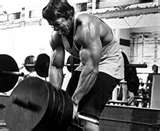For years, one debate that has been tossed back and forth in just about every gym and fitness center across the country is; which is better, heavy resistance training or light resistance training? A variety of factors play into this debate, and the answers may not be as obvious as it may seem.
For years (and still today) many weight training enthusiasts thought that the key to getting stronger and building bigger muscles was simply to perform heavy resistance training by lifting big weights. Conversely, it was also thought that if an individual wanted to increase muscle tone or improve weight loss, heavy weights were the enemy and one must aim for higher reps with lighter weight. Years of experience have shown us that this is not always the case.
Muscles grow when they are forced to compensate for extra work. Think about when you first began lifting weights. Within a few months, the muscle growth you experienced was phenomenal, but after a while it dramatically slowed down. This initial explosion of muscle growth was due the fact that your body was not accustomed to lifting weights. Therefore, your muscles rapidly began to grow in size to keep up with their newly acquired task of weight training.

Let’s say you always follow a heavy resistance training program when you go to the gym. You will undoubtedly hit a plateau when you can no longer push any heavier weight. Your muscle growth has stalled. You decide to incorporate a higher rep range instead of your normal one, and suddenly your muscle growth once again takes off. This different training style has caused your muscles to adjust for their newfound workload.
On the flip side, if you constantly train with lighter weight and higher reps, then you switch to lower reps with heavy weight, the same spurt of new muscle growth may happen.
Muscle fibers are categorized into two classes: fast twitch and slow twitch. When you consistently train with heavy weights at lower reps, you focus more on your fast twitch fibers. Fast twitch fibers are excellent at generating short bursts of strength or speed. Slow twitch fibers are more efficient at generating continuous muscle contractions over longer periods of time, perfect for light resistance training with a high rep range. When you switch up your training, you can hit both of these muscle fiber types instead of focusing on one.
Of course, we cannot forget about the all-important role that nutrition plays in muscle growth. You can spend all day in the gym, training with both heavy and light weight and still never gain another ounce of muscle if your don’t consume enough calories to fuel growth.
Let’s go back to our scenario of our first few months in the gym. Back then, it didn’t really matter what you were eating, it seemed that everything was helping you to gain more muscle. This approach no longer works after a few months, and to keep adding muscle, you must consume adequate protein and calories.
Now, as far as the idea that light resistance training with high reps will help tighten up and tone muscles, think about this; when a bodybuilder begins their contest preparation, they don’t all of the sudden switch to lighter weight to help strip body fat. The entire outcome of their contest prep depends on their nutrition plan. They could do sets of 100 reps, but if all they consumed were cheeseburgers, their physique will not come in looking its best. Since this is true of a bodybuilder preparing for a contest, wouldn’t the same rule apply to the average person who wants to look better? Absolutely.
The human body is remarkably adaptable. In order to keep muscles growing, you must challenge them in different ways, and be sure to consume a proper diet. Try not to fall into the trap of doing the same workout day in and day out. As the saying goes, “If you always do what you’ve always done, you’ll always get what you’ve always got.”
 Tim Mielke
Tim Mielke Author and Supplement Expert
www.i-supplements.com
Tim Mielke has been involved in the supplement industry for over 15 years. As a former competitive body builder and personal trainer, Tim has extensive first-hand knowledge of the benefits and pitfalls of fitness supplementation. Knowledge so extensive that his book, “The Book of Supplement Secrets: A Beginners Guide to Nutritional Supplements,” was recently published and is currently available through Amazon.com. Tim brings this supplement and bodybuilding know-how to www.i-supplements.com as a contributing author and researcher.